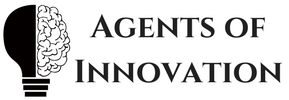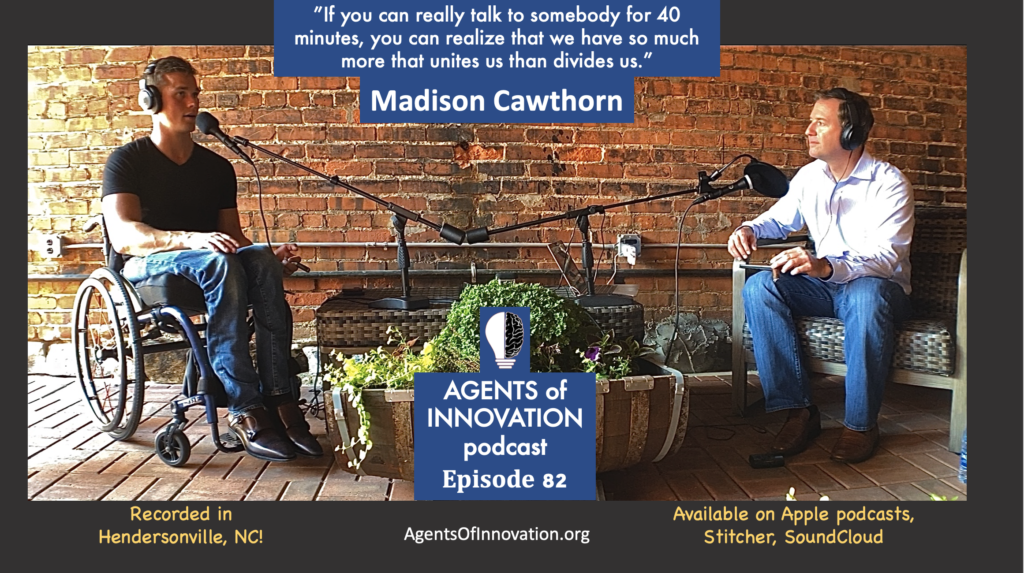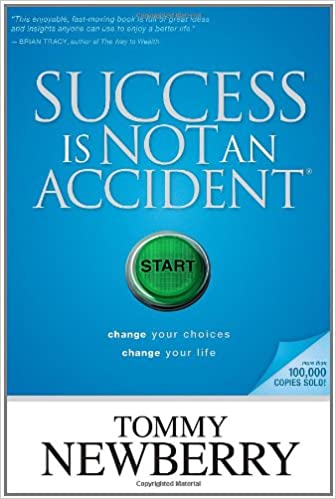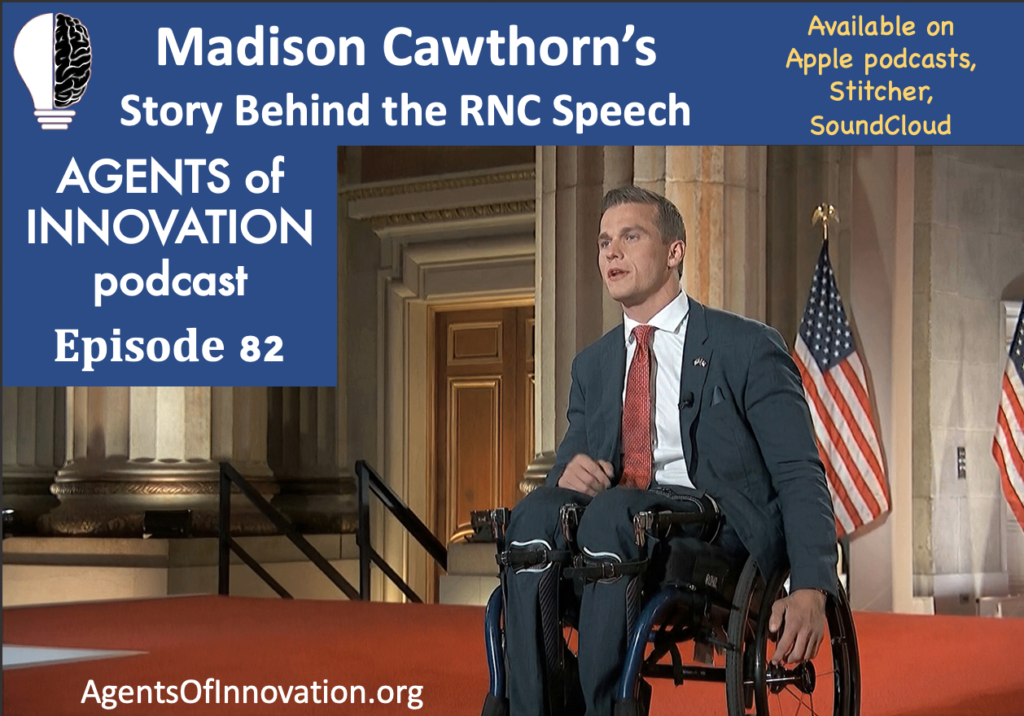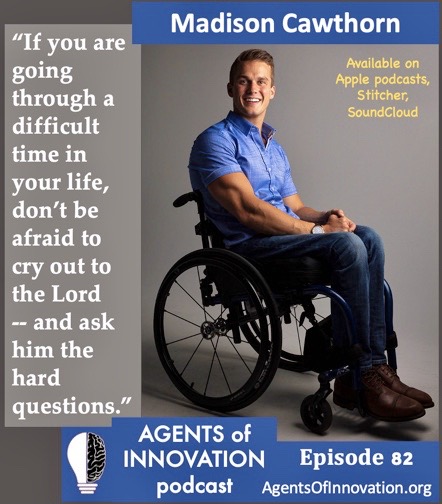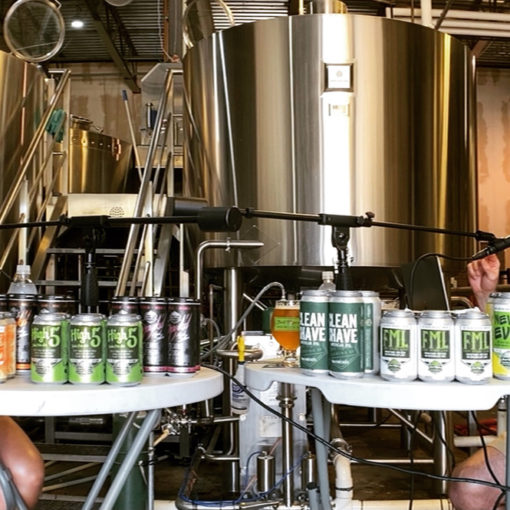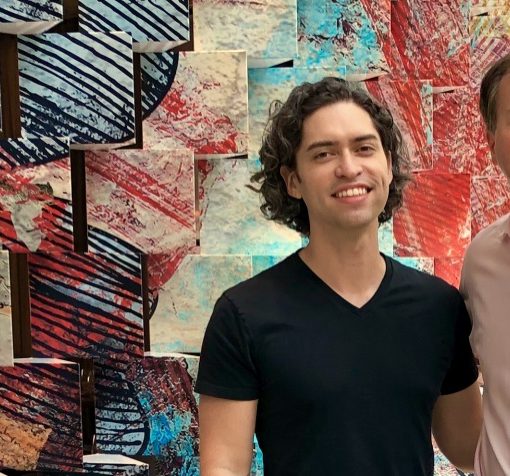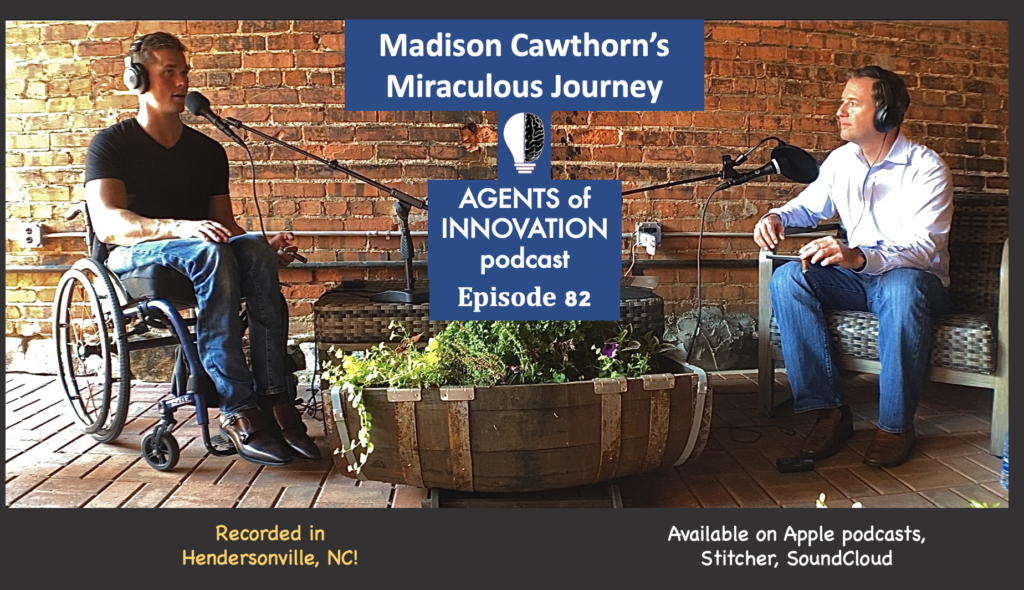
Episode 82 of the Agents of Innovation podcast features an interview with Madison Cawthorn, a candidate for the U.S. House of Representatives in North Carolina’s 11th Congressional District. A dark horse in the race, he won the Republican Primary with a sweeping victory in the runoff in June 2020. Should he be elected in November, at age 25 years old, he’ll be the youngest member of Congress in over 220 years.
On August 26, he was given a major platform to speak at the Republican National Convention where he stole the hearts of millions of Americans when he stood up, out of his wheelchair, to proclaim, “You can kneel before God, but stand for our flag.” This moment was made more dramatic due to the fact that Cawthorn is partially paralyzed after he was in a horrific car accident at the age of 18.
Just three days after his moving speech at the RNC, Cawthorn sat down with Francisco Gonzalez, host of the Agents of Innovation podcast, for an hour-long conversation over cigars at Casablanca Cigars in his hometown of Hendersonville, North Carolina. “There’s a reason I was raised to be so patriotic,” said Cawthorn. “This place is the American Dream.”
Madison is a cigar aficionado. He and his father have been smoking cigars together since he was 15 years old. “My dad and I are close friends. We love spending time together and having long conversations,” said Cawthorn. “Since you don’t inhale any smoke from cigars, we found this was an awesome pastime for an athlete like me, someone who is a strong Christian, and someone who just wanted to spend time with my dad.” He recounted the many hours he and his father talked over long walks and sitting on the back deck, while enjoying cigars. “This is a great medium to a great conversation.” And indeed it also was for us, on Episode 82 of the Agents of Innovation podcast.
“The great thing about cigars is it gives you something to do, you have to sit down. If you start having a conversation when you start a cigar, you are pretty much forced into at least a 40-minute conversation and I have found no matter what someone’s background is, no matter what their political background is, if you can really talk to somebody for 40 minutes, you can realize that we have so much more that unites us than divides us.”
A compelling part of his personal journey was when Cawthorn nearly lost his life in a tragic car accident seven years ago, at the age of 18, which left him partially paralyzed. His community rallied around him and led him through his miraculous recovery.
Prior to the accident, at the age of 18, Madison had been nominated to apply to the U.S. Naval Academy. He also had a full ROTC scholarship to attend North Carolina State University. “Life was everything I wanted it to be, 18 years old, the world at my fingertips, recalled Cawthorn.
But while on a road trip to Florida with a friend, both young men fell asleep in a car and it plowed into a concrete barricade at 75 mph, with Madison absorbing the majority of the impact. He was given about a 1% chance to live. After a year and a half period of recovery, he was left partially paralyzed, without use of his legs, and with his spinal cord receiving the most damage.
“Living life with a spinal cord injury is a series of probably 20,000 minor setbacks every single day,” said Cawthorn. “On paper it looks like I will never be able to walk again. I am a man that believes in the unthinkable. I was very near death and I believe God brought me back from that – and a group of very talented doctors. I do believe, that moving forward, that I will have the opportunity to walk again through the power of science and through a great miracle that I think is going to happen. But as of right now that forever changed my life – it really did.”
One thing that hasn’t changed is his passion for cooking. “I love to make food and I love to eat, obviously. I practice French cooking, so a lot of butter. It’s a really good time.”
Cawthorn is an 8th generation North Carolinian and comes from a long line of descendants who served their country. He has family in the Marine Corps going back to the 1780s. “I believe I am the first generation to let that down,” said Cawthorn. “But now I have found a way to serve in a different capacity.”
Cawthorn says that the best thing anyone can do when life throws you a curve ball is to respond with decisiveness. “As you can imagine, I went through a really dark time,” said Cawthorn. “I decided one day that I am going to make a decision: I am either going to decide to live life to the fullest as much as I can despite of the wheelchair, or I’m just going to give up. You can either be a sad person in a wheelchair or you can be a happy person in a wheelchair – doesn’t change the fact that you are going to be in a wheelchair. So, I was going to make a decision and embrace one fully.”
“Once I got down to the fact that I can still make a difference, even in a wheelchair, I realized that I was going to keep moving forward. I was not going to give up. I took the thought of suicide completely out of my mind, pushed that to the side, and I started going after life.”
Cawthorn says his favorite book is Success is Not an Accident by Tommy Newberry. “The entire book is about how success, very rarely, comes from just a happenstance,” said Cawthorn. “I believe I’m very lucky to be in the position I am in. I define luck as a great opportunity met with extreme preparedness.”
“I believe anyone who is thinking about taking on a different life direction, who wants to change careers, or maybe is being forced to change careers, or maybe forced to change their life because of some traumatic injury or something traumatic that has happened in their lives: I tell you, you can still achieve great things, so long as you are willing to sit down and decide: when I close my eyes, where do I see myself in 10 ten years? And then, start working backwards from that goal.”
Additionally, he encourages others to draft a mission statement about your life. And then, at every important step in your life, when you have big decisions to make, ask yourself: “Which one of these decisions gets me closer to that? I think as long as you continue moving forward with that one singular purpose in your mind, you can achieve anything.”
Madison’s recovery period following his accident was about a year and a half. He then decided to take a crack at college, attending a small school outside of Washington DC. But after one year, he made another decision.
“I really struggled with: why do I want to go to college? Is it just because it’s some cultural norm? Or is it because I really feel I really need to? Now, my fiancé, is a medical provider, she works in anesthesia. That’s someone who I believe absolutely needs to go to college. I have several friends who are pre-law, they are about to become lawyers and pass the bar. These are people who really need to go to college.”
“But I think we do ourselves a disservice when the American nuclear family defines success of their children by if they got their kid to a four-year degree school.” He cited the challenge of saddling more and more young people with student loan debt, but also added that he believes we need to “start bringing honor and integrity and dignity back to the trades. We need to give more money and more funding to trade schools and people getting apprenticeships.”
He decided to become a motivational speaker and also to start his own company, a real estate investment firm. Many of the messages he delivers, as a motivational speaker are about “being intentional” and also offering encouragement.
“Life goes on,” said Cawthorn. “As we all know, the good times never last. But the bad times never last either. So, keep your head down, focus on that mission statement you have in your life and keep walking.”
Considering he might be one of the few members of Congress with a disability, Cawthorn reflected on what his role could be in helping bring these issues to the forefront for millions of Americans who are challenged by a disability. “Here in America, for people with disabilities, this is the life of luxury because of the ADA – the Americans with Disabilities Act – passed in the 1990s. The ADA does a great job,” he said. “Except it does go short in some areas.” For example, “historic areas are exempt from the ADA. That’s something I would like to do: is expand the American with Disabilities Act to historic areas because I think that’s more inclusive for everybody. I’m a big history buff … so going to a historic area is a huge passion of mine, but there’s a lot of areas I just cannot get to. And there’s a myriad of other issues we can tackle with the ADA, but especially in the workplace.”
Cawthorn was a product of home school education, which partly influenced his early love for history. He took Latin and read some of the early Roman works, including Julius Caesar’s Britannica. He also listens to Dan Carlin’s Hardcore History podcast.
Cawthorn suggests that one of the reasons people are not very interested in history is that “they make history so black and white; it’s all about dates, it’s all about locations; it’s all about memorizing small situations, when history is really so vibrantly colorful.”
“If you really dive deep into the stories of history and you really put yourself in that position and you have a real master storyteller explain it to you, you will walk away with remembering so much more about the issues than if you just sat down and read a textbook,” said Cawthorn. “And so that’s a challenge I think that parents should take upon themselves: to really study history so they can effectively tell it in a compelling way and that will create a love in that child’s mind for history and then they will want to learn the dates; but give them the reason they want to learn those dates first.”
As a history buff and avid traveler, Madison Cawthorn loves to travel, even in his wheelchair. Back in 2017, he took a trip across Europe, stopping at many historical sites, including the Eagle’s Nest, Hitler’s famous military strategy compound, high atop the Bavarian Alps, on the border of Germany and Austria. Today, hundreds of thousands of tourists visit the site each year, including those who follow the show Band of Brothers. The end of that series ends with Easy Company taking and occupying the Eagles Nest, as they did at the conclusion of the European theater during the Second World War. Madison and his brother stopped there in 2017. But then, when he ran for public office, and won the Republican Primary, political opponents used this against him, insinuating he was a Nazi sympathizer for visiting “a Hitler site.”
“It was an incredible place to get to go, to see where we conquered that extreme evil that happened,” said Cawthorn. “People go there – a lot of Jews actually go there – to revel in the defeat of Nazism. And I really went there as a middle finger to Adolf Hitler. A man who is going there speaking English with his brother, who is a man in a wheelchair, a man the Nazis would have targeted to kill, is now going there and just enjoying my time. That is just saying: not only did we defeat you, but we truly defeated you. Almost an entire century later, we’re reveling where you used to.”
Considering politics today has become so corrosive and filled with such personal destruction, to the extent that people would try to claim that someone like Madison Cawthorn is a Nazi sympathizer because he traveled to a historic site, Madison was asked why someone like him would consider living such a public life and running for public office knowing full well these kind of vicious attacks on his character are forthcoming.
“I just got engaged and I would much rather of just gotten married this summer, I’d much rather be on my honeymoon, sitting on the beach with a Corona in it, a cigar in my hand, and hanging out with my wife, going over a Bible study, and watching the sunset,” said Cawthorn. “But when I got engaged, my fiancé and I had the conversation about when we want to have kids. We are making a plan for our family, and one night I’m sitting outside with my dog, and I was thinking: is this a culture I want to raise my child in?”
“Like I said earlier, I’m a pretty decisive person. We are faced with this problem in our country of a negative culture, of our country moving in the wrong direction … and unfortunately, we do not have time to wait. Our country is on the precipice of becoming something totally different.”
“I think this cancel culture has come from a place of the ends justify the means in every situation so they will do anything they can to destroy somebody,” said Cawthorn. “It’s a reason why a lot of good people do not run for Congress.”
In his run for Congress, he won a huge victory in a heavily contested and highly talented primary in North Carolina’s 11th Congressional District. His opponent in the runoff had been endorsed by the President, mostly due to the fact that his opponent was good friends with the wife of Mark Meadows, the President’s Chief of Staff, who was the previous occupant of the seat. But after Cawthorn won, the President graciously reached out and invited him and his family to the White House, where they had an opportunity to visit the Oval Office.
While still in Washington, Cawthorn was invited to join Rudy Giuliani for cigars. Madison had already made plans to visit the monuments at night with his fiancé, his brother, and his sister-in-law. So, after initially accepting the invitation from the former Mayor of New York City, he went back and politely declined the invitation. That’s when Giuliani’s son told Madison: “I think you’re making a mistake. I think this cigar could change your life.” His fiancé told Madison to do the cigars with Giuliani. It turned out to be a wise decision.
Unbeknownst to Cawthorn, one gentleman gathered there with Giuliani was in charge of the Republican National Convention. He then told Madison: “Imagine the entire country is watching you right now and you have five minutes to get a message across, what do you say?”
“On the spot, impromptu, I had to give a speech,” says Cawthorn. “The entire story of that speech, it all comes down to one line. When I’m doing a speech or like this interview, I always like to make a few narrow sentences that define what I’m going to be pushing for. And so, what I said I’m going to be pushing for is: in this country, we kneel before our God and we stand for our flag. And that has a dual meaning. When we kneel before our God, it means we are a religious people. I subscribe to the Judeo-Christian values and many other religions have very similar values also of acceptance, tolerance, love, kindness, compassion. That’s who we are as an American people. We are loving. We want to be around one another. That’s a reason I had my friends come next to me to show in America we lift one another up. But then the second part of that is that we stand for our flag. It means we are patriotic. It means that we will not be intimidated by a mob. We will not back down from our beliefs and we will not cower in fear. And the hybrid of those two systems is what I genuinely believe is the spirit of America. It is one that is loving and kind but is also ferocious and will not be messed with.”
Madison has been a Christian all his life. Before the accident, “I used to always view God as my commander,” said Madison. “It was sir, I am here to serve you, give me an order and I will go achieve it. But after my accident, he was one of the only things I had left to cling to. And I really created a relationship with him that was true, that was honest. And so, you know what, I’m not afraid to – I’ve yelled at God – and He’s strong enough, He can take it. If you are going through a difficult time in your life, don’t be afraid to cry out to the Lord. Ask Him the hard questions because I promise you he has an answer for them. He will give them to you. He has never left me in the dark when I really needed His help.”
“The Bible calls us to be innocent as doves,” said Cawthorn, “but to be shrewd as snakes. I’ve made that as a mission statement of my life.”
Cawthorn has a video series called The New Town Square, a way in which he uses social media to get across ideas. “We live in an age of a new town square. Merchants would so often have to gather in a physical town square to do business. But we live in this new high-tech world where I can go online and start a business … and where anything is possible.”
His advice to those wanting to make a difference through social media is this: “I say shy away from making social media fit into some box or some algorithm for yourself. Just make content that actually makes people want to get on when they see that you posted something new … make them crave what you want to show them,” said Cawthorn. “Make whatever post that you’re making, make them worth someone’s time.” It seems that every aspect of Madison Cawthorn’s life is defined by being intentional.
“The only way you can be intentional is to know your mission in life, to know what you’re trying to achieve,” said Cawthorn. “Me and several of my guys all wear these compass necklaces. All of us do. And the reason we wear them is because I try to really impart in them and my friends really try to impart in me – many of my mentors – is to be intentional. Know which direction you’re heading. When life gives you a storm, when the good times don’t last, when the bad times come, whether it’s a traumatic injury, whether you just got broken up with in a long-term relationship, or you are going through a divorce, whatever it is, no matter what hits you in your life, you still have your true north and you can still move forward towards that goal.”
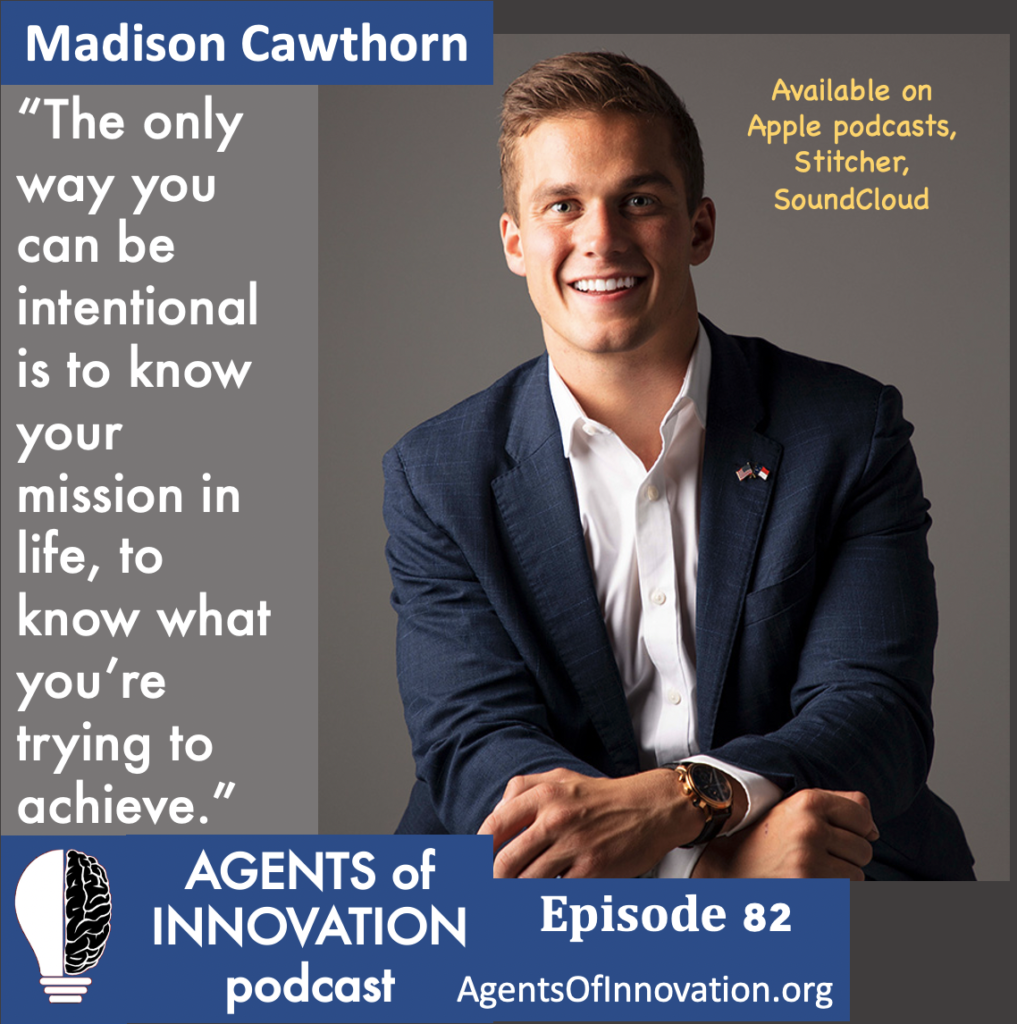
“There are a lot of setbacks individuals have to deal with in all parts of life,” said Cawthorn. “The sun is not always going to be shining and you need to have a plan for when things go south. And so be intentional about everything that you do.”
You can listen to the interview on Episode 82 of the Agents of Innovation podcast, on Apple podcasts, Google podcasts, Stitcher, and SoundCloud. You can also follow the podcast on Facebook, Instagram, or Twitter.
You can also watch our series of short clips of the conversation:
Video clip #1 Cigars with Madison Cawthorn
Video clip #2 Madison’s Life-Changing Experience
Video clip #3 The Story Behind the RNC speech
Video clip #4 Actionable Insights: Madison Cawthorn
Video clip #5 Madison Cawthorn: On The Importance of Faith
Video clip #6 Madison Cawthorn’s Love for History
Video clip #7 Entrepreneur Beginnings: Madison Cawthorn
Video clip #8 Innovative Perspectives: Madison Cawthorn
We welcome your comments below and encourage you to write a review on Apple podcasts.
